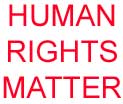Universal Declaration of Human Rights (UDHR) – December 10, 1948
United States Declaration of Independence – July 4, 1776
Fifteenth Amendment to the United States Constitution – “The right of citizens of the United States to vote shall not be denied or abridged by the United States or by any State on account of race, color, or previous condition of servitude.” — ratified February 3, 1870
— Background
Nineteenth Amendment to the United States Constitution – “The right of citizens of the United States to vote shall not be denied or abridged by the United States or by any State on account of sex.” – certified adoption on August 26, 1920
— background
U.S. Civil Rights Act of 1871
U.S. Civil Rights Act of 1964
U.S. Civil Rights Act of 1968
St. Petersburg Declaration – March 2007
China Charter 08 – December 10, 2008
Our universal human rights include religious freedom, freedom of thought, and freedom of conscience.
The Universal Declaration of Human Rights states:
Article 2.
Everyone is entitled to all the rights and freedoms set forth in this Declaration, without distinction of any kind, such as race, colour, sex, language, religion, political or other opinion, national or social origin, property, birth or other status. Furthermore, no distinction shall be made on the basis of the political, jurisdictional or international status of the country or territory to which a person belongs, whether it be independent, trust, non-self-governing or under any other limitation of sovereignty.
Article 18.
Everyone has the right to freedom of thought, conscience and religion; this right includes freedom to change his religion or belief, and freedom, either alone or in community with others and in public or private, to manifest his religion or belief in teaching, practice, worship and observance.
